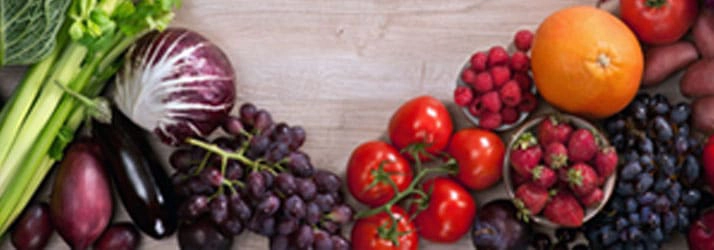Tuesday's Q&A in Lafayette LA - 5/6/14

Can you believe it's May already? Since Summer here in Louisiana is in full swing we couldn't think of a more appropriate time to talk PESTICIDES. The summer season always brings delicious fruits and vegetables, but if you are not shopping at local farmers markets or not purchasing USDA certified organic, you need to be aware of the chemicals that mass retailers use to literally give their fruits and vegetables "shelf-life."
Don't want to eat fruits coated with toxins? Neither do we! And neither does the Environmental Working Group, or, EWG, which thankfully tracks what's actually in and on our food in Lafayette LA.
On Tuesday they released their annual Shopper's Guide to Pesticides, which breaks down which fruits and veggies have the most pesticides and which have the fewest. Their goal is to bring some transparency to our food supply and help you decide when it's worth shilling out extra for organic produce. Apples topped the toxic list for the fourth year in a row, which may not come as a surprise in the wake of news that they're often covered with a chemical that's banned in Europe.
If it fits in your budget, the EWG recommends buying organic whenever possible. And if it's just not affordable right now, their guide can help you make more informed, healthy choices. The bottom line, says the EWG, is that it's always good to eat more fruits and vegetables, even if you're exposed to pesticides. Now you can be a little smarter about it.
Some highlights from the report:
• A single grape sample contained 15 pesticides.
• The average potato had more pesticides by weight than any other food.
• Single samples of celery, cherry tomatoes, imported snap peas and strawberries showed 13 different pesticides apiece.
The fruits and veggies with the most pesticides, known as the "Dirty Dozen" are:
- Apples
- Strawberries
- Grapes
- Celery
- Peaches
- Spinach
- Sweet bell peppers
- Nectarines (imported)
- Cucumbers
- Cherry tomatoes
- Snap peas (imported)
- Potatoes
- Hot peppers
- Kale/collard greens
And the fruits and veggies with the least pesticides (the "Clean Fifteen") are:
- Avocados
- Sweet corn
- Pineapples
- Cabbage
- Sweet peas (frozen)
- Onions
- Asparagus
- Mangos
- Papayas
- Kiwi
- Eggplant
- Grapefruit
- Cantaloupe
- Cauliflower
- Sweet potatoes
The Food Quality Protection Act of 1996 marked dramatic progress in the federal government's efforts to protect Americans from dangerous pesticides. The landmark legislation required the Environmental Protection Agency (EPA) to assess pesticides in light of their particular dangers to children and to ensure that pesticides posed a "reasonable certainty of no harm" to children or any other high-risk group. This law is credited with reducing the risks posed by pesticide residues on food. It forced American agribusiness to shift away from some of the riskiest pesticides. But worrisome chemicals are not completely out of the food supply. Residues of many hazardous pesticides are still detected on a handful of foods.
That's where the EWG comes in. Because the Government operated EPA has not complied with the Congressional mandate in full, for more than a decade EWG has published an annual shopper's guide to help people eat healthy and reduce their exposure to pesticides in produce (the abbreviated guide is listed above as the "Dirty Dozen & Clean Fifteen." Armed with the EWG's Shopper's Guide, millions of people take comfort in knowing when they shop at their local grocery store, they will only purchase conventionally-raised fruits and vegetables that tend to test LOW for pesticide residues. When a customer wants foods which test HIGH for pesticides, they buy organic. Make sense?
Some 65 percent of thousands of produce samples analyzed by the U.S. Department of Agriculture test positive for pesticide residues. That's bad news for the growing number of Americans who want to minimize their consumption of pesticides. Parents' concerns have been validated by the American Academy of Pediatrics, which in 2012 issued an important report that said that children have "unique susceptibilities to [pesticide residues'] potential toxicity." The pediatricians' organization cited research that linked pesticide exposures in early life and "pediatric cancers, decreased cognitive function, and behavioral problems." It advised its members to urge parents to consult "reliable resources that provide information on the relative pesticide content of various fruits and vegetables." One key resource, it said, was EWG's Shopper's Guide to Pesticides in Produce. With EWG's Shopper's Guide, consumers can have the health benefits of a diet rich in fruits and vegetables with less exposure to pesticides.
For this week's recipe - in lieu of SUMMER - how about a salad?
Squash & Brussels Sprout Pasta Salad with Brown Sugar Balsamic Vinaigrette
- 1/2 pound Gluten Free rotini pasta
- 1 1/2 cups brussels sprouts, quartered
- 3 tablespoons organic safflower oil, divided
- 1/2 large acorn squash, sliced (or yellow squash)
- 2 cups spinach, slightly torn
- 1 tablespoon brown sugar
- 1 tablespoon balsamic vinegar
- 1 teaspoon dijon mustard
- salt and pepper, to taste
- 1/3 cup roasted, chopped pecans (or almonds, or walnuts)
1. Preheat oven to 400F, and start a pot of water boiling on the stove top.
2. Coat Brussels sprouts and squash slices with 2 tablespoons vegetable oil. Place on a foil-lined baking sheet. Bake for about 16 minutes, until the squash is fork tender and the Brussels sprouts are browning.
3. When the water boils, add pasta and cook for about 8-10 minutes, until cooked through.
4. Meanwhile, whisk together brown sugar, balsamic vinegar, remaining tablespoon of oil and mustard for dressing.
5. With a skillet on medium heat, toss chopped nuts around for a few minutes (do not take your eyes off of them because they burn quickly! A light roast should take no more than 3-5 minutes).
6. When everything is done cooking, chop the sliced squash into bite-sized pieces. Toss everything together in one bowl and sprinkle the chopped, roasted nuts on top.
By Francesca Marino D.C.
OFFICE HOURS
Monday
8:30am - 5:30pm
Tuesday
8:30am - 5:30pm
Wednesday
Closed
Thursday
8:30am - 5:30pm
Friday
7:30am - 11:30am
Saturday & Sunday
Closed
Open for Massage & Treatment
During Business Hours
Modern Chiropractic
318 Bertrand Dr #101
Lafayette, LA 70506



